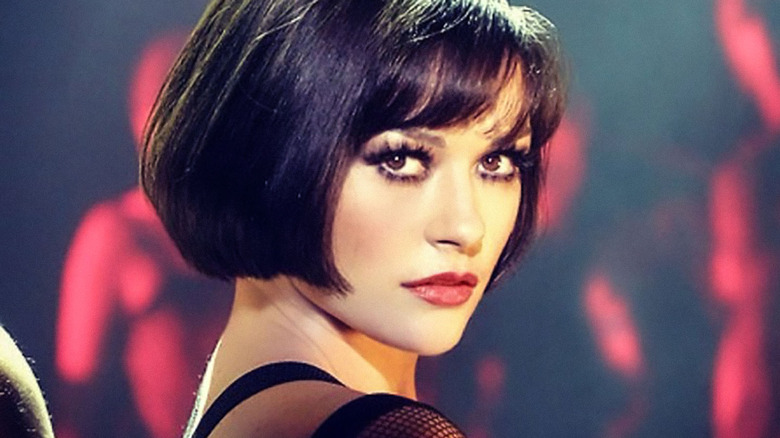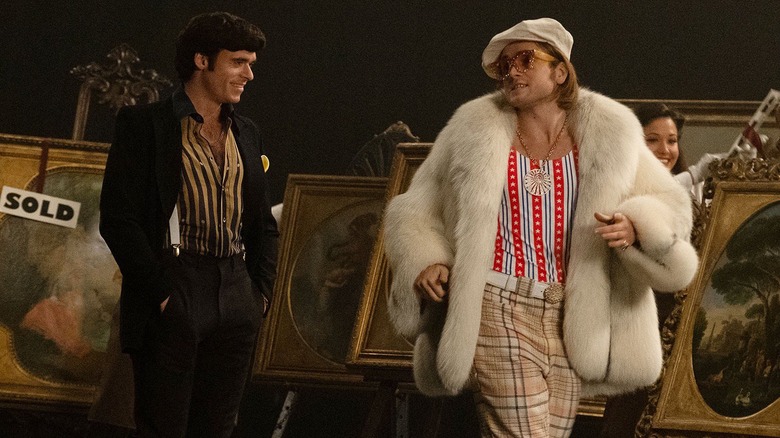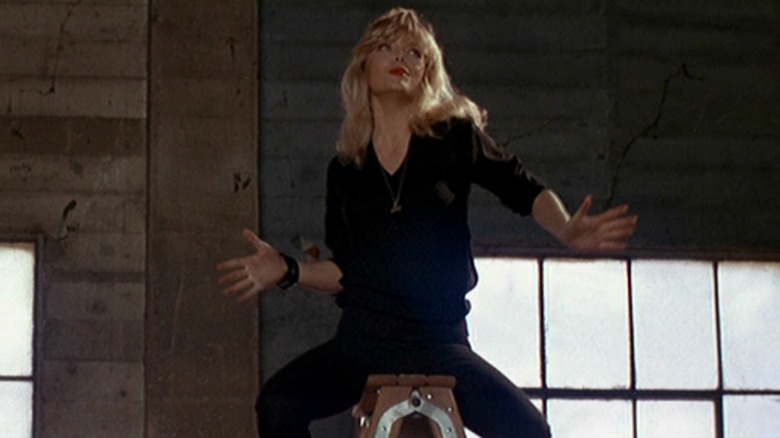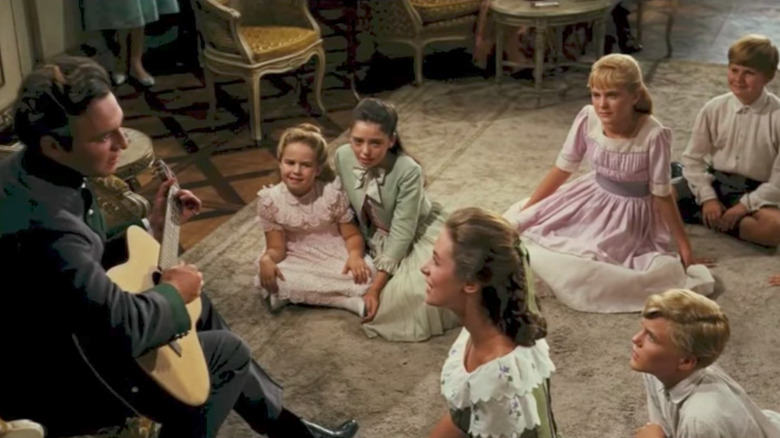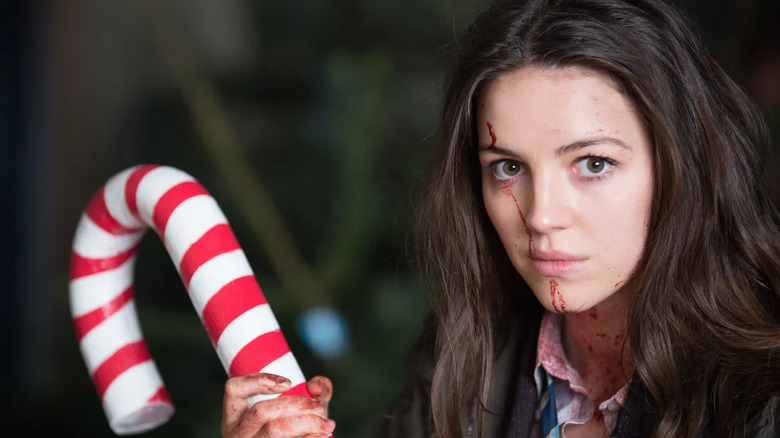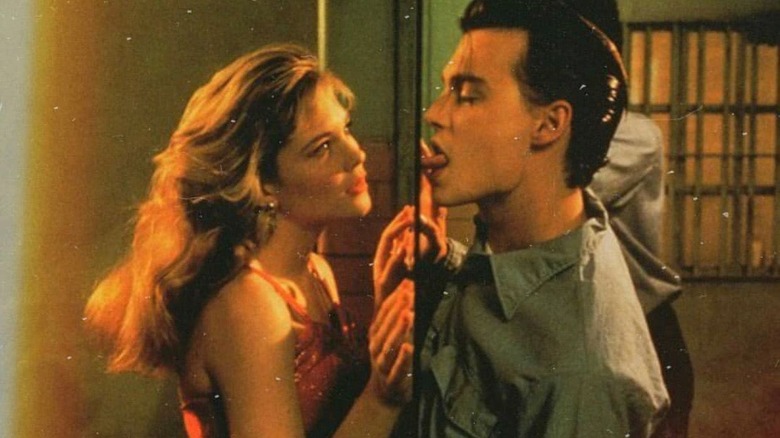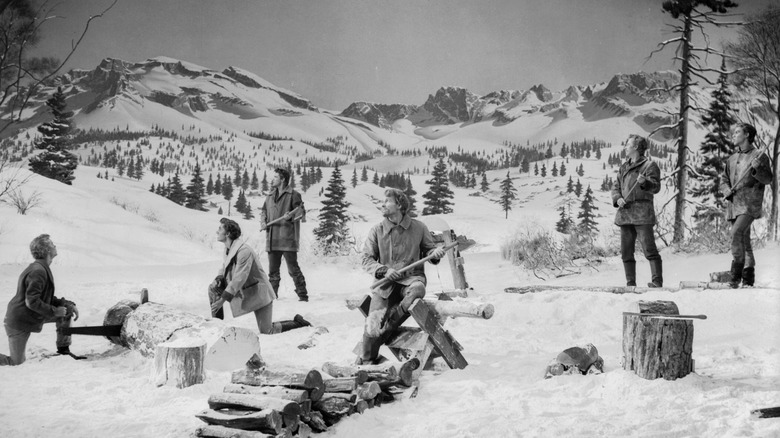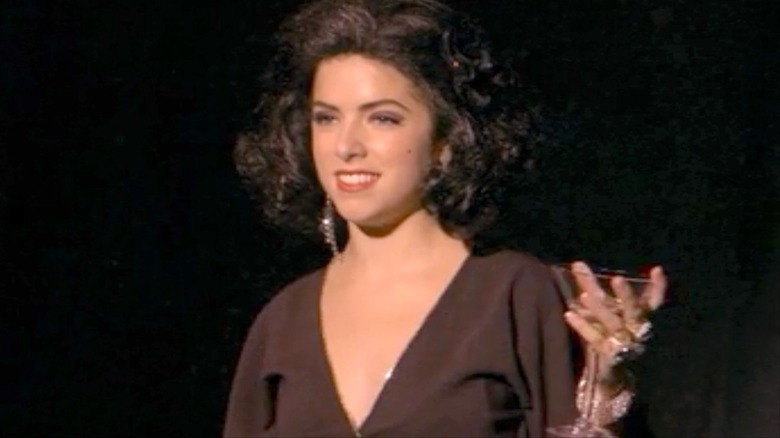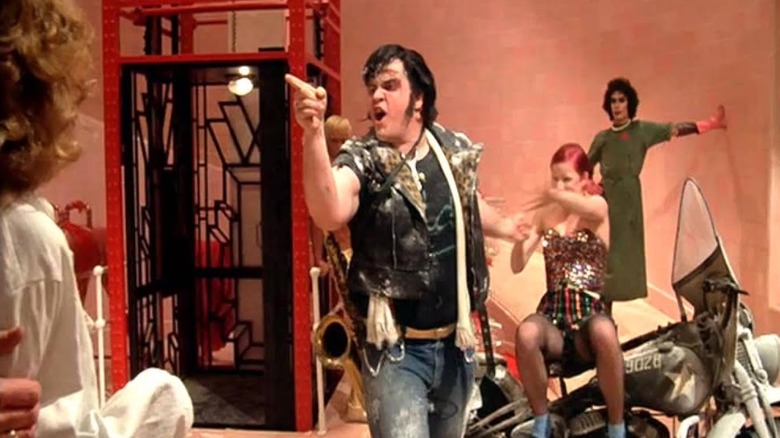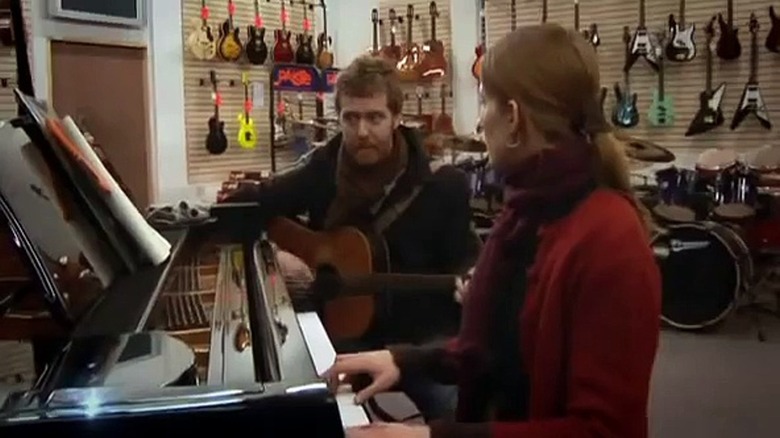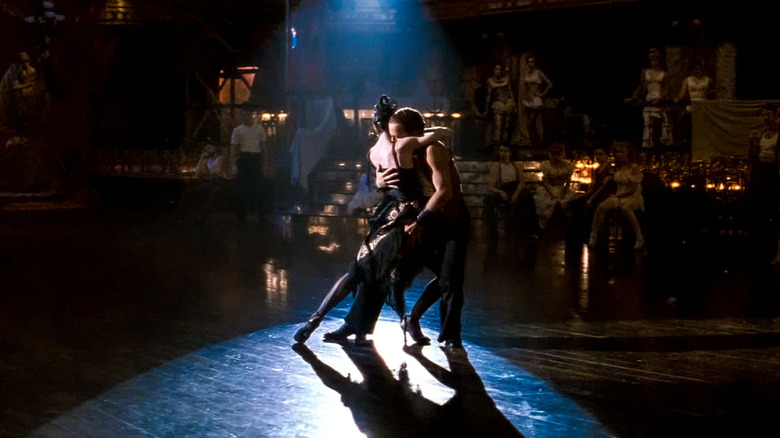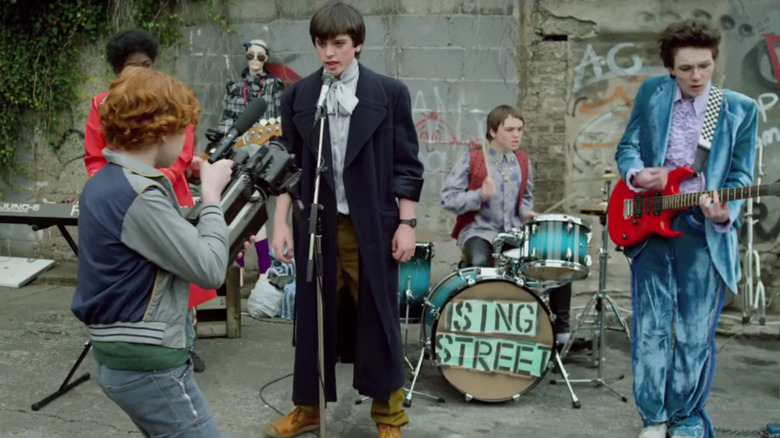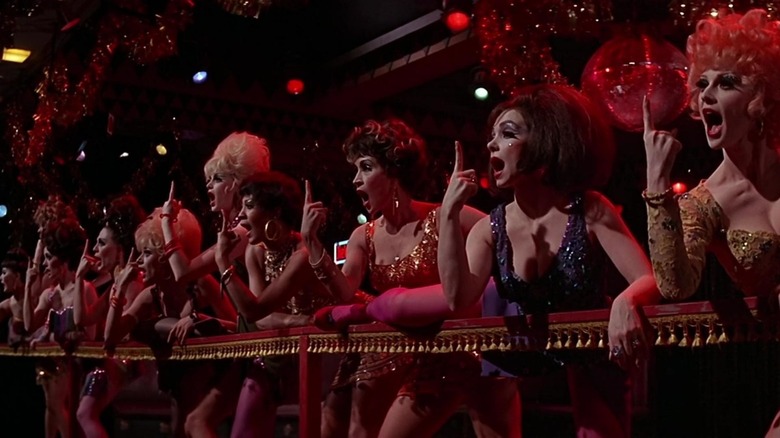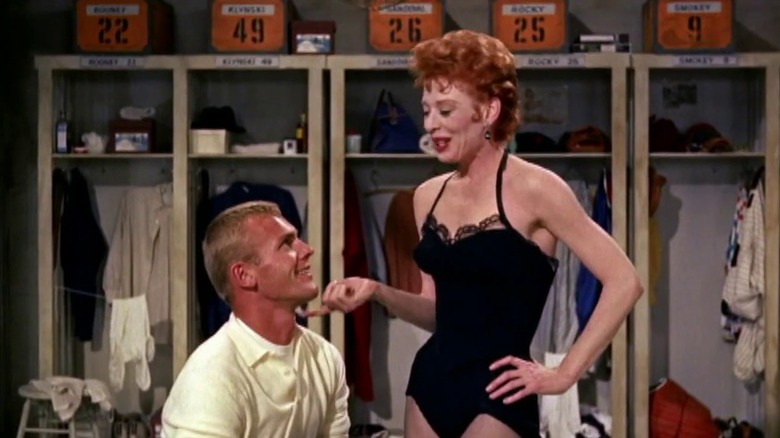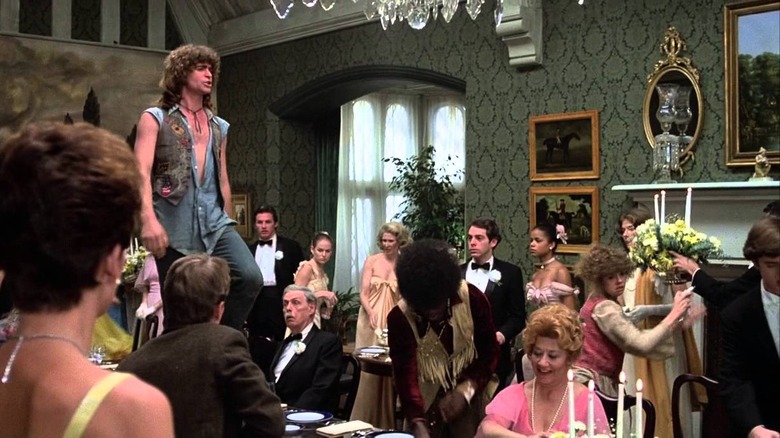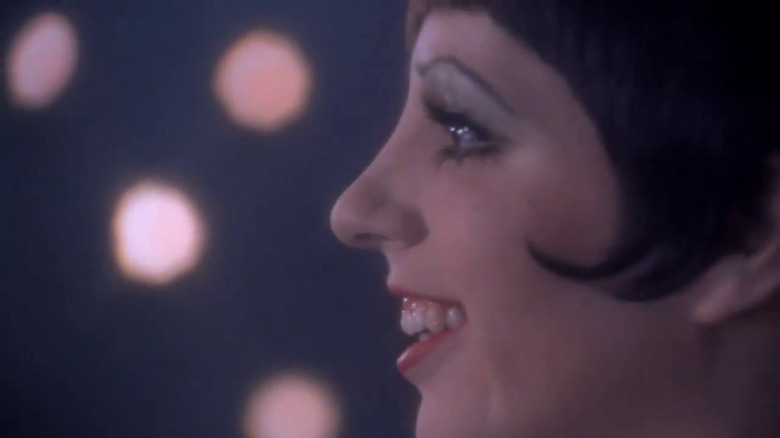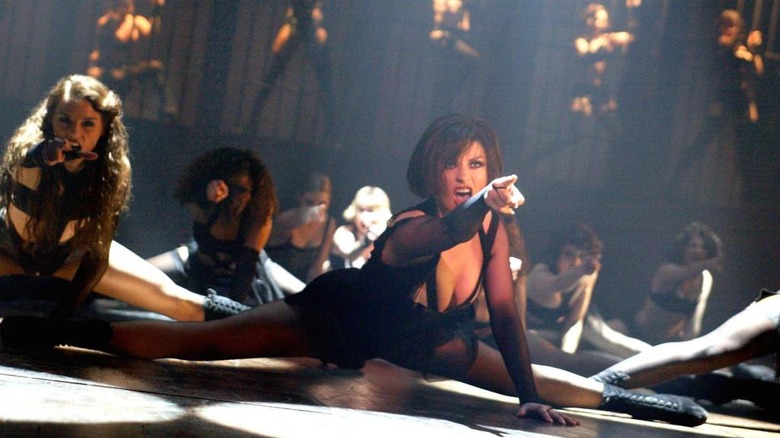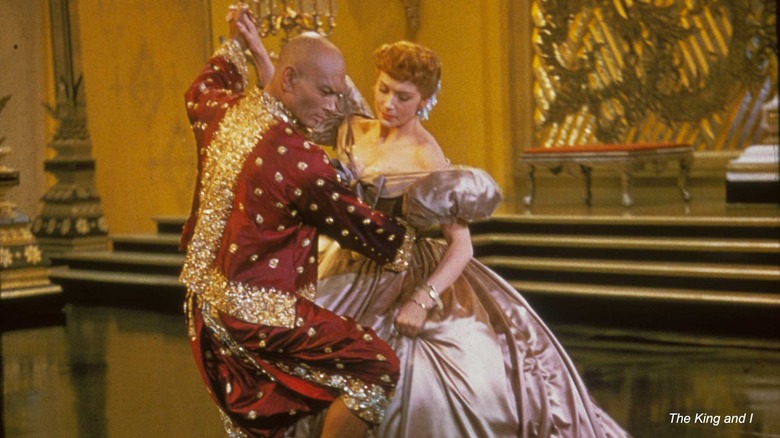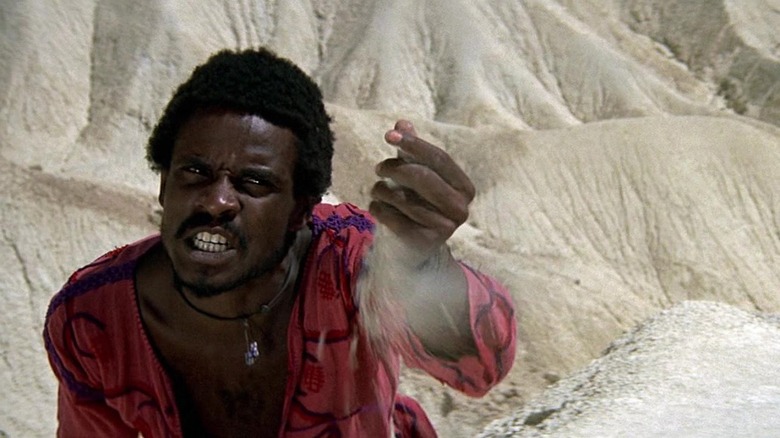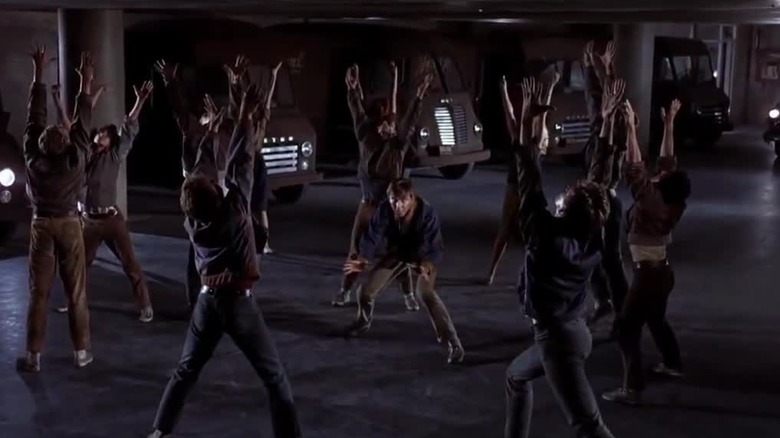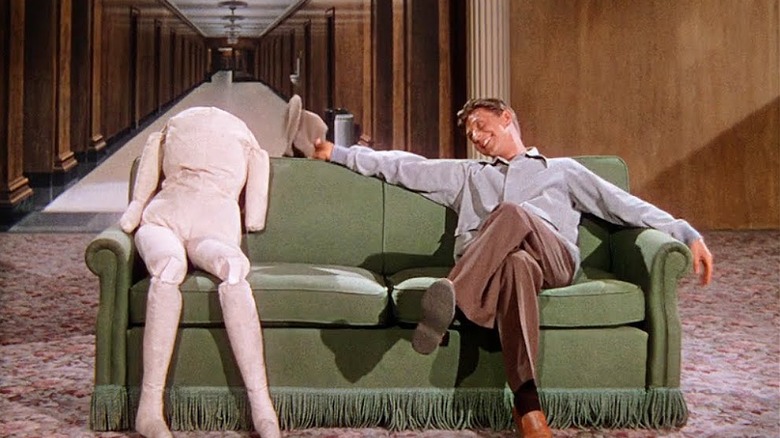21 Greatest Movie Musical Songs Ranked
There's nothing like a good movie musical number. The combination of music, dance, and narrative thrust build something vibrant and alive in a way that, when done well, reflects cinematic storytelling in its purest form. Characters are given permission to express their emotions in ways that they are frequently unable to do: song frees them from the strictures of polite conversation, and lyrics capture their true feelings where dialogue often falls short.
And what's fascinating is that although there are certain elements that we associate with the filmed musical number, directors and choreographers have the opportunity to be endlessly creative, and these sequences have changed over the decades with the evolution of movie musicals themselves. From massive, hyper-stylized set pieces of the 1950s and 1960s to the jazz-inspired choreography of Bob Fosse and the more naturalistic, pared down musicals that would come later, there's always something new and surprising in these song-and-dance numbers.
21. Honky Cat - Rocketman
A biopic about a music icon is always going to be more effective when it allows itself to be an actual musical, leaning into the theatricality of a figure like, say, Elton John. Throughout "Rocketman," the musical numbers have fantastical elements, evoking the spirit of the performer rather than just doing a rote chronology of his life. And "Honky Cat" is a great example of this stylish, presentational quality. Elton (Taron Egerton) has been starved for affection his entire life, and when John Reid shows a romantic interest in him, he falls head over heels.
"Honky Cat" details their relationship, with Reid encouraging John to embrace his lavish tastes, contributing to a pattern of excess that would define the artist long after the two lovers broke up. Although it's a cheeky, light-hearted number, it also showcases how easily Reid can take advantage of an overeager Elton John, who was always far more invested in their relationship, foreshadowing the dark turn their romance would take. But most of all, it's amazingly catchy. What more can you ask for?
20. Defying Gravity – Wicked
Ah, "Defying Gravity" — the song that made every musical theater kid wildly overconfident about their belting abilities. There are, like, seven people on God's green earth who can physically sing "Defying Gravity," and thankfully, one of them is Cynthia Erivo, who stars as Elphaba in Jon M. Chu's adaptation of the beloved Broadway musical.
As it does in the stage musical, "Defying Gravity" ends the first half of "Wicked's" story by letting Elphaba fully realize her powers and take flight for the very first time, and while Chu makes a few confusing decisions in the film version of "Defying Gravity" (namely the choice to keep cutting away from Erivo while she's performing one of the biggest and grandest songs in the musical theater canon), the spectacle is pretty undeniable, especially when Erivo and her co-star Ariana Grande — who simply sprints away with "Wicked: Part One" — get to share tender moments together (and incredible harmonies) as Elphaba and Grande's Glinda prepare to part ways "for good." Erivo and Grande's chemistry shines in the smaller moments of the song until Erivo is given the opportunity to put her own spin on the song Idina Menzel made famous, and if you don't tear up just a little bit when Erivo does her final vocal run, you're dead inside.
19. Cool Rider - Grease 2
Full disclosure: there were some who questioned the inclusion of "Grease 2" on this list. "Grease 2?" they asked incredulously. "Not the original Grease?" But you heard right. Because for the record, we would put Michelle Pfeiffer's ladder-straddling performance of "Cool Rider" up against anything that "Grease" has to offer. When Michael Carrington (a very dreamy Maxwell Caulfield) is smitten with Pfeiffer's Stephanie, he can't help but wonder what kind of guy the very disaffected Pink Lady would actually get excited about it. The answer? A cool rider, of course.
Now, a cool rider has a lot of desirable qualities, as outlined by Pfeiffer in her musical number. But the most important by far is that he needs to not just ride a motorcycle, but ride it well. This revelation will completely transform Michael's high school experience, inspiring to him to become nothing less than a mysterious stunt rider. It works as an early '80s banger of a breakaway pop hit, and it neatly sets up Michael's ridiculous character arc for the rest of the film. A job well done!
18. Edelweiss - The Sound of Music
There are definitely more famous songs in "The Sound of Music" than "Edelweiss," but it's the one that has the most emotional impact. This one, short, made-up Austrian folk song accomplishes two main tasks that are essential to the film. Firstly, it reconnects Captain Von Trapp (Christopher Plummer) with his children, showing that before their mother died, he was a gentler man more in touch with both music and his own emotions. Secondly, it establishes the Captain as a fervently patriotic man, for whom watching the Anschluss unfold as the Germans annex Austria is utter torture.
This sets up one of the most powerful moments in "The Sound of Music," when the family has been allowed to perform in a music festival before the Captain will be forcibly enlisted into the navy of the Third Reich. When they sing "Edelweiss," members of the audience join in the chorus — a brief, subtle act of resistance against the fascist forces.
17. Give Them a Show - Anna and the Apocalypse
In the past ten years or so, there have been few more pleasant surprises than "Anna and the Apocalypse." After all, genuinely good original movie musicals don't come around every day, let alone Christmas zombie comedy musicals. Anna (Ella Hunt) is in the midst of an existential crisis at school, recovering from an awkward romantic encounter with a classmate and trying to convince her dad to be OK with the idea of her traveling to Australia for a bit instead of going straight to university after graduation. Then zombies invade, and all of that seems slightly less important than the matter of simple survival.
"Give Them a Show" comes at the climax of "Anna and the Apocalypse," as Anna faces off against her tyrannical vice principal Mr. Savage (Paul Kaye), who has fully embraced the chaos of the zombie apocalypse. At the beginning of the film, Anna struggles with apathy, shutting down emotions altogether rather than allowing herself to feel them. But with "Give Them a Show," she commits herself to what is a revolutionary act amidst the devastation of the horror movie landscape: not giving off. She may not win her battles, or even survive them, but she is determined to fight them all the same. It's one of the more earnest songs in "Anna and the Apocalypse," and it strikes a genuinely poignant chord.
16. Please Mr. Jailer - Cry-Baby
In many ways the evil twin of "Hairspray," (also directed by John Waters), "Cry-Baby" is a quirky, twisted musical about a romance between a well-heeled "square" named Allison (Amy Locane) and Cry-Baby Walker (Johnny Depp), a local juvenile delinquent. Their unexpected emotional connection raises some eyebrows among both of their social groups, but the chemistry between the two cannot be denied. Still, their budding relationship faces some significant hurdles before it can get off the ground, chief among them the fact that Cry-Baby has been sent away to a penitentiary.
Allison, for her part, mounts an iconic defense of her man with "Please, Mr. Jailer." She turns up outside the prison, standing on top of a sports car in a to-die-for red dress, begging for Cry-Baby to be set free. Amy Locane and Johnny Depp sell the sheer horniness of the musical number — one that incorporates the rest of the prisoners in what feels like an over-the-top satire of Elvis Presley's 1957 film, "Jailhouse Rock."
15. Lonesome Polecat - Seven Brides for Seven Brothers
When you've got seven brothers living all together out in the snowy wilderness, separated from the rest of society for months out of the year as they are in "Seven Brides for Seven Brothers," of course they're going to be a little lonely. A little restless. "Lonesome Polecat" captures their melancholy spirit as they chop wood in the midst of winter, acutely aware of the absence of womenfolk in their lives. It's a slow, plaintive melody, one that keeps in perfect rhythm with their chopping and sawing.
But the most impressive aspect of the musical number is the control that the dancers have over the very real weapons they're holding in their hands. When one of the brother performs a ballet solo with what looks to be a sharpened axe in his hand, swinging it with real purpose as he dances, it's difficult not to be amazed at the power and grace of his movements. It's obvious that even if this is axe is too blunt to chop actual wood, it would still do serious damage with one wrong move. A quiet, understated piece of choreography that is frequently overshadowed by the showboating of the Barn Raising dance sequence, "Lonesome Polecat" is an unassuming standout in "Seven Brides for Seven Brothers."
14. The Ladies Who Lunch - Camp
A young girl is on stage about to do the solo of her life, only something has gone terribly wrong. She's supposed to be singing, but every few seconds she has to briefly excuse herself to vomit, clearly suffering from some serious food poisoning (or, as the case may be, regular poisoning — the intrigues of a theatrical summer camp know no bounds.) The weirdly intense Fritzi takes over, and Anna Kendrick is introduced to the world.
"Camp" is an independent movie musical about students at a drama camp — theater kids who go out in the woods over the summer not to do arts and crafts or get murdered by Jason, but to perform in age-inappropriate productions of Broadway hits. Here, Fritzi is singing "The Ladies Who Lunch" from Company, a song that was originally performed by an exasperated Elaine Stritch mocking the lives and borderline alcoholism of upper class WASPs, if that gives you any indication of how bizarre it is to have a 14-year-old girl in the role. But to be fair, Anna Kendrick makes a meal out of it, playing the natural humor of having a literal child on stage breaking a cocktail glass by clutching it too hard as well as imbuing the character with a drunken rage that is wildly inappropriate but absolutely perfect.
13. Hot Patootie - Rocky Horror Picture Show
What, no "Time Warp?" OK, so "Time Warp" may be one of the most memorable songs from "Rocky Horror Picture Show," but in terms of narrative impact, it can't hold a candle to what "Hot Patootie" is capable of. You have to stand in awe of what Meatloaf is able to accomplish in just a few short minutes. A little over halfway through the film, the character of Eddie appears, somewhat dramatically, by driving his motorcycle through the wall of the castle.
In this one song, we learn about his history with Frank, his romance with Columbia, and a whole lot of backstory that puts some of the interpersonal dynamics at Chez Frank-N-Furter into greater context. The second he shows up, "Rocky Horror Picture Show" gets a fresh burst of energy, with Meat Loaf sounding every inch a '50s-era jukebox singer. It's just a shame that it has to end so quickly, what with Frank brutally axe-murdering Eddie and all.
12. Falling Slowly - Once
Most of the time, movie musicals tend to be known for their over-the-top sense of theatricality. That's not true of John Carney's "Once," which is refreshingly naturalistic, focusing on the relationship between two musicians as they collaborate on new songs and eventually fall in love (although their romance may be ill-fated from the start.) The focus throughout the film is on the two uniquely talented lead musicians, and as such, there aren't a lot of bells and whistles that distract from their performances. It's sort of like the MTV Unplugged version of a movie musical.
The most famous song from "Once" is "Falling Slowly," a quietly romantic ballad performed with very little fanfare: Markéta sits at her piano, with Glen next to her on acoustic guitar. But despite the fact that it isn't a traditionally bombastic musical theater song, it became a breakaway hit, one of the rare pieces from a musical that ends up being played on the radio. And as a crowning achievement, it won Best Original Song at the 2008 Academy Awards.
11. El tango de Roxanne - Moulin Rouge
The whole strategy of "Moulin Rouge" is to incorporate modern musical numbers into a period setting, with the anachronistic atmosphere creating a vibrant energy that only director Baz Luhrmann could bring to life. And while there are a few questionable song choices scattered throughout the film, "El tango de Roxanne" does the most with the brief, taking a 1980s Police song about falling in love with a hooker and giving it a tragically operatic quality.
This is Christian (Ewan McGregor) at his low point: he fully comes to terms with the fact that Satine (Nicole Kidman) has no choice but to be intimate with the Duke (Richard Roxburgh), yet he can't stop himself from feeling intensely jealous about their relationship. His plaintiff cries serve as a counterbalance to the erotic tango number performed by the Unconscious Argentinean (Jacek Koman) and Nini (Caroline O'Connor.)
10. Riddle of the Model - Sing Street
Really, the question here was not whether "Sing Street" should make an appearance on this list, but which song, because there are no skips in John Carney's entire soundtrack. In the end, "Riddle of the Model" seems as good a choice as any. It establishes Sing Street as an actual band with potential (albeit a slightly goofy one that hasn't quite figured out their visual aesthetic), creating a surprisingly catchy ode to 1980s pop in the vein of Duran Duran. This is the moment that they go from being a lie that Conor (Ferdia Walsh-Peelo) made up on the spot to catch Raphina's (Lucy Boynton) attention to a real musical group.
And the genius of the song is that it's good enough to show that they have legitimate talent, but it still captures the inherent flaws that you would expect in a young and inexperienced band. They don't really know what they're doing: they accidentally knock over parts of the drum kit while they're filming, and there are hints of self-consciousness as they are acutely aware of themselves trying to look cool. And it's all utterly charming.
9. Hey Big Spender - Sweet Charity
"Hey Big Spender," a painstakingly choreographed number from Bob Fosse for "Sweet Charity," is perhaps the single least tantalizing performance involved prostitutes ever committed to celluloid. The women we see here are call girls, and the second a man walks into their establishment, they go to work. They're saying all the things you would expect in a bid to attract his attention (small compliments, come-ons), but it's done with such precision that it feels almost mechanical. There's no romance here; if anything, they're bored.
Fosse's choreography has given these girls robotic movements that give their seduction the appearance of a well-oiled machine — they've essentially desexualized themselves. Predatory and frenetic, their dance feels more like a mating ritual than anything human. Between Fosse's contributions to the number and the wild-eyed yet somehow unimpressed performances from the girls in the line, "Hey Big Spender" has become the most memorable sequence in "Sweet Charity."
8. Whatever Lola Wants - Damn Yankees
The fact that "Whatever Lola Wants" is about three minutes of the incomparable Gwen Verdon doing her thing is probably all we need to say about this musical number. It's one of the best movie musical sequences because Verdon has a raw seductive power that she's never gotten enough credit for, and is on full display in "Damn Yankees." A twist on the traditional "Faust" morality tale, Tab Hunter stars as a middle-aged man taking a test drive in the young, well-muscled body of a professional baseball player.
Lola, as a representative of the devil, is pulling out all the stops to get him to commit to the deal — because once he does so officially, he trades away his soul. And for Lola, "all of the stops" includes a sensual dance number where, in addition to getting his new body in exchange for his soul, he gets her body. Her seduction is a masterclass in control: her movements vacillate between hyper-precise gyrations and wild, animalistic gestures. And whether she's miming a phone conversation in a very silly baby doll voice or shimmying out of a pair of black lace pedal pushers, it's impossible to take your eyes off her.
7. I Got Life - Hair
For most of its runtime, "Hair" operates as a deconstruction of the traditional Hollywood musical. It has a song called "Sodomy" which is essentially just a laundry list of different, uh, physical acts, for crying out loud. But nowhere is this more evident than in the "I Got Life" sequence, where the group of hippies, led by the anarchic Berger (Treat Williams), crash a party held by the parents of Sheila (Beverly D'Angelo), whom Claude Bukowski is infatuated with. Normally, we would expect a musical sequence to be carefully choreographed with precise dance movements that evoke a sense of grace and order.
This, on the other hand, embraces the chaos. Berger climbs up onto the long dining room table and dances across it wildly, as guests embark on a mad dash to remove the dishes from his line of fire. He introduces mayhem to their lives with his joie de vivre, just as his fellow hippies would upend the social order with their counterculture ideals. Theirs is a materialistic world, where every plate and candlestick is something precious worth protecting; Berger, by simply listing his body parts, evokes the opposite, a man who has nothing to his name but his own person.
6. Maybe This Time - Cabaret
Everyone, raise a glass to the eternal optimist: Sally Bowles. Liza Minnelli got her big break in "Cabaret," bringing to life Sally, the cabaret singer who never stops wishing for happiness. The tragedy of Sally is that her dreams are never going to come true. She doesn't seem as though she's ever going to become a big star. She's always going to be dating someone who lets her down. And yet, she always hopes for the best.
"Maybe This Time" is as endearing as it is, honestly, kind of pathetic. She is acutely aware that things have never quite worked out for her, romantically or professionally. Her performance at the Kit Kat Klub is intercut with scenes of the relationship between Sally and Brian (Michael York), as she clings to the brief but blissful honeymoon period where they are contented with one another. This is Sally laid bare, hoping against hope that things will change for her: that just this once, her boyfriend won't leave her, that she will feel loved, happy, successful. Alas, it is not to be. But we love Sally because despite everything, she never becomes cynical or bitter. No matter what, she always hopes that this time will be different.
5. Cell Block Tango - Chicago
An anthem of feminine rage, "Cell Block Tango" is not just the best musical number in "Chicago," it's arguably one of the best in all of musical theater. As Roxie Hart (Renee Zellweger) is held in a women's prison awaiting trial for the murder of her lover, she becomes acquainted with the Merry Murderesses, the other women who have been arrested on homicide charges. Each performs a stylized reenactment of the crime that sent them to jail, each placing the blame somewhere else.
"He had it coming," they sing, years of anger and abuse and resentment bursting forth in a moment of fiery vengeance. "It was a murder, but not a crime." In a society where women held little power in their relationships with men, it's disturbingly empowering to see them have some sense of control, even if there were fatal consequences. Gorgeously lit with a backdrop of women behind bars in addition to the main ensemble, "Cell Block Tango" is a visual feast, a violent and definitive explosion of female agency peppered with a wry sense of humor.
4. Shall We Dance? - The King & I
There's a tendency to view many of the movie musicals from the 1950s as overly sanitized: visually sumptuous, but essentially free of true, raw romance. But anyone who would think that clearly hasn't seen "The King & I" and the blistering tension between Yul Brynner and Deborah Kerr in the "Shall We Dance?" sequence. After the King of Siam hosts a successful party for European diplomats in an effort to display himself as a sophisticated, forward-thinking monarch, Anna reminisces about some of the dances she attended back home in England.
Their conversation leads to an impromptu dance lesson, one that forces both of them to acknowledge their sudden intimacy. In terms of pure lustful energy, Yul Brynner sliding his hand onto Deborah Kerr's waist while maintaining eye contact the entire time is pretty much the 1950s equivalent of a full-on love scene. Their dance is ebullient and romantic, but it came at a price: Kerr suffered constant bruising from the hoop of her skirt, and Brynner required oxygen between takes as he only had one lung.
3. Heaven On Their Minds - Jesus Christ Superstar
You hear that iconic guitar riff, and you know this isn't going to be your typical gospel story. We begin "Jesus Christ Superstar" with Judas (Carl Anderson) alone in the desert, horrified at the mythos developing around Jesus and warning him that to continue on this path would be incredibly dangerous. Starting the film in this way does two things: it establishes Judas as already isolated (physically and emotionally) from Jesus and the other apostles, and makes it clear that he will be the central figure in this narrative, not just Jesus as one might expect.
We learn of the conflict that will define "Jesus Christ Superstar," eventually leading Judas to famously betray Jesus Christ. But most importantly of all ... "Heaven on Their Minds" is a legitimately great rock song. And there's no one on the planet that can do justice to this song like Carl Anderson. He brings such a raw, emotive quality that makes it clear how difficult it is for Judas that he's struggling to criticize someone he respects and admires.
2. Cool - West Side Story
When you're talking about great songs from "West Side Story," there's a pretty deep bench. The instinct is probably to go for "America," which has a tremendously fun dance sequence to accompany its social commentary (even if the film version is toothless compared to the original theatrical production.) But "Cool" is an underrated gem, brimming with barely suppressed rage.
It represents one of the most significant changes when the musical was being adapted for the screen: rather than having "Cool" closer to the beginning of the show, they move it to after Riff dies in a knife fight, amping up the emotional tumult and overwhelming grief experienced by the Jets. Their instincts are to find a violent outlet for their feelings. But their new leader Ice admonishes them: they have to stay in control. The choreography is alternately restrained and explosive, their movement restricted by the claustrophobia of the low ceilings in their hideout, creating the most visually stunning dance sequence of "West Side Story."
1. Make 'Em Laugh - Singin' in the Rain
Let's get one thing out of the way up front: there are no bad musical numbers in "Singin' in the Rain." Even the super long and not particularly relevant "Broadway Melody" has Cyd Charisse as a flapper to keep you entertained. But the absolute best is unquestionably Donald O'Connor's one man show in "Make 'Em Laugh." He's trying to cheer up Don (Gene Kelly), who is feeling guilty that his antics got Kathy (Debbie Reynolds) fired from her job and he hasn't been able to find her to make it up to her.
What follows is not only the pinnacle of physical comedy, but also a reminder of Donald O'Connor's incredible athleticism. He got his start in vaudeville, and he pulls out all the stops here, including running up a wall and doing a flip multiple times. His performance is so physically demanding that there were rumors afterwards that O'Connor was bedridden for days following the filming of the number (although O'Connor debunked this in an interview with Roger Ebert near the end of his life.)
